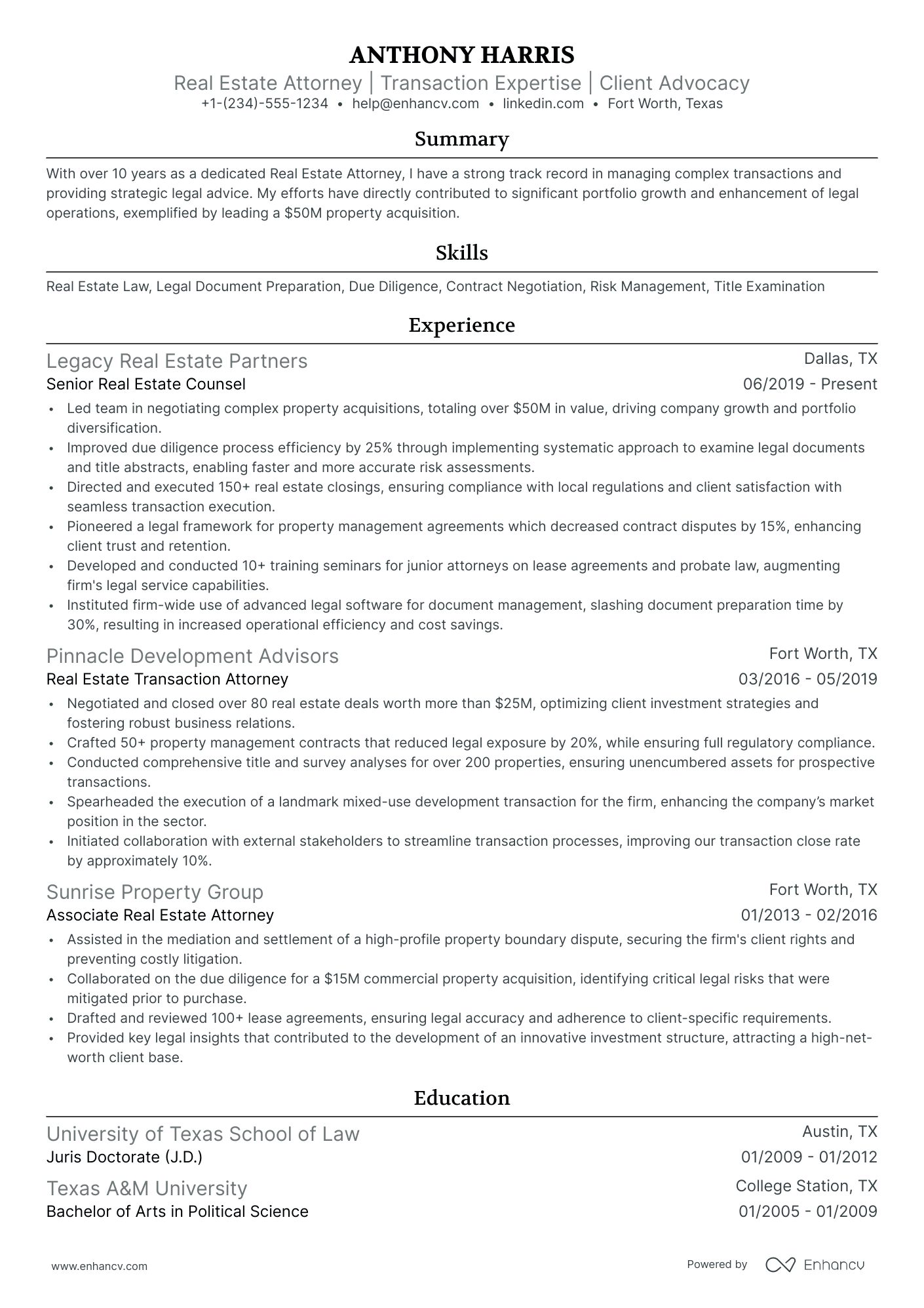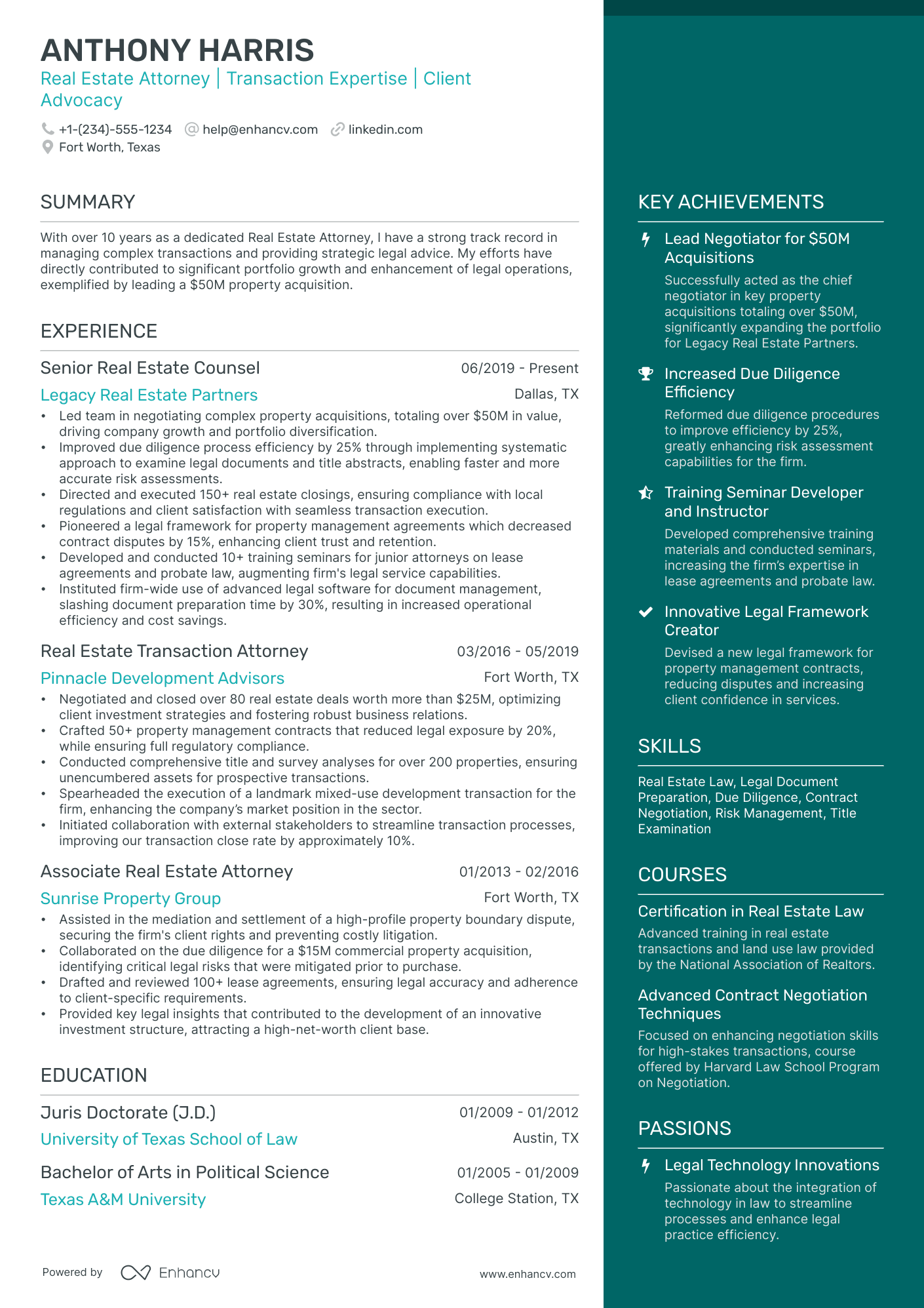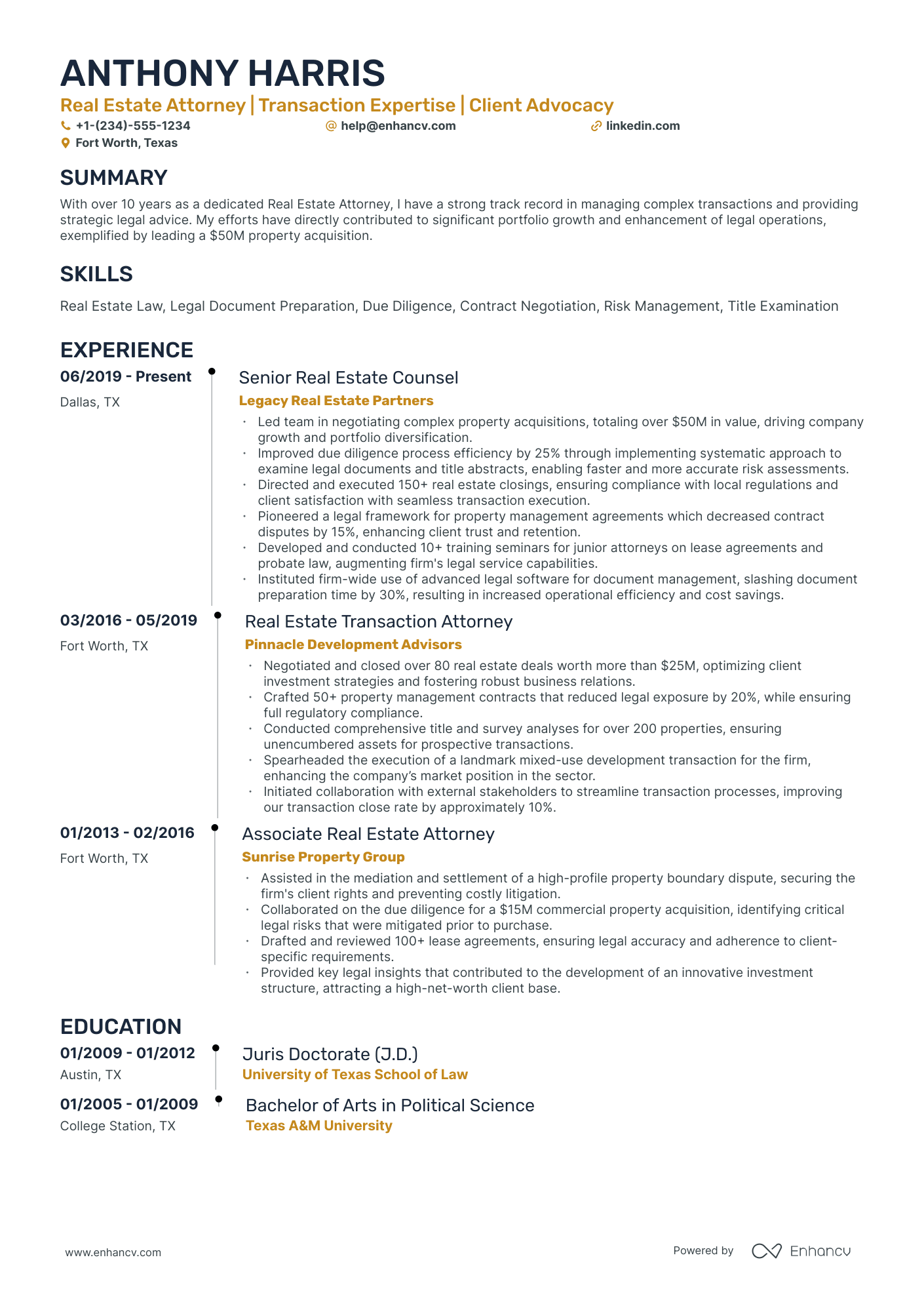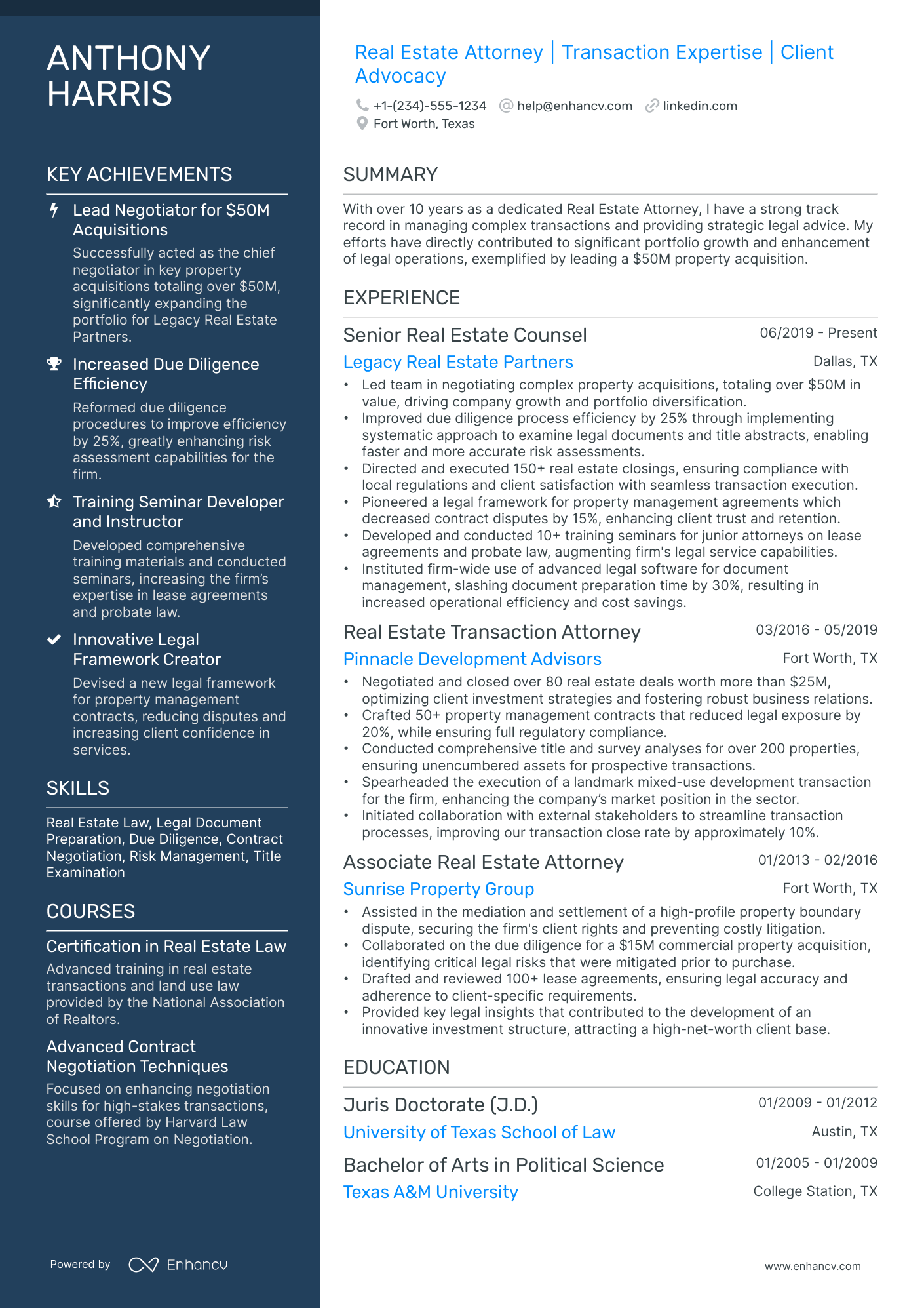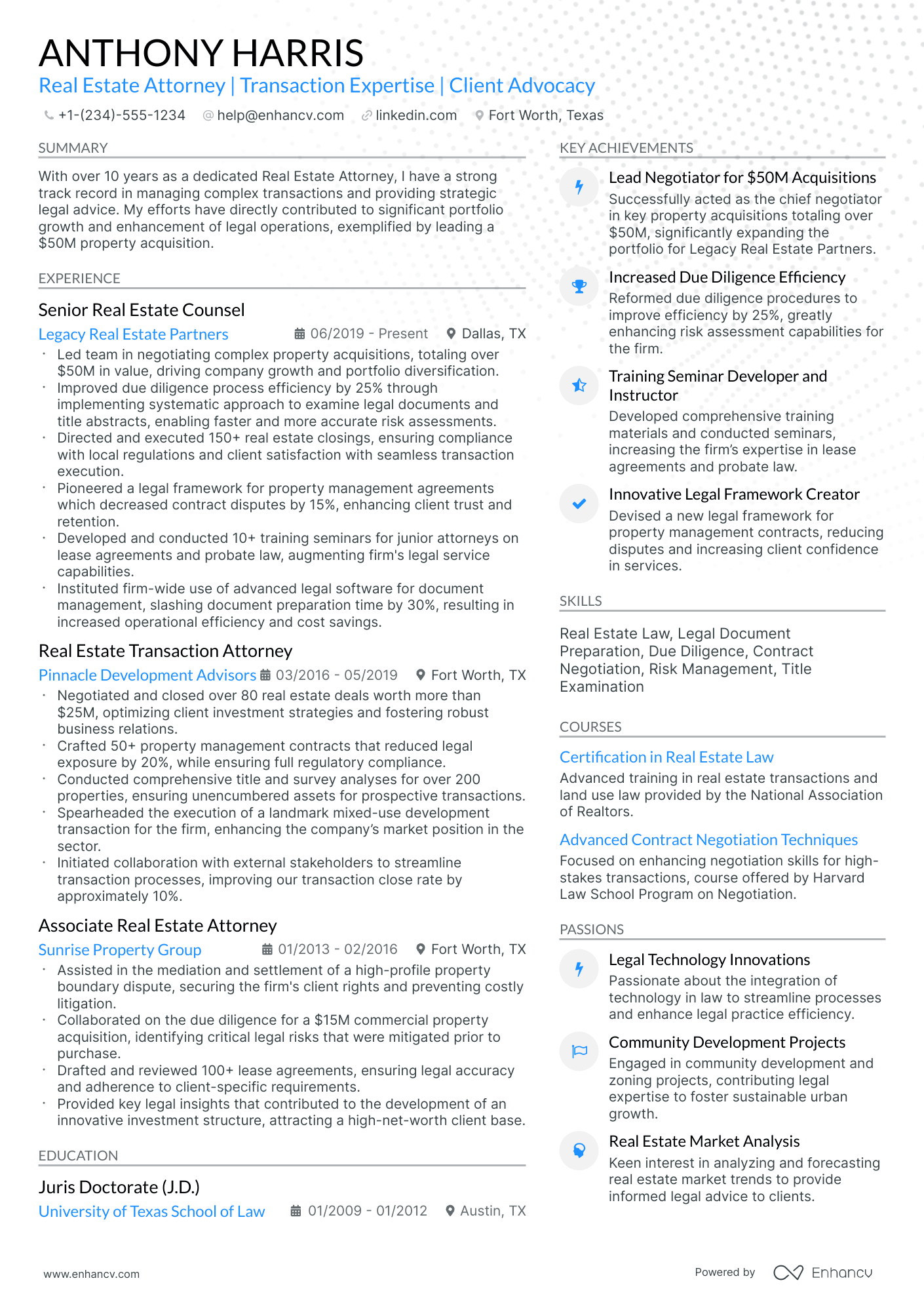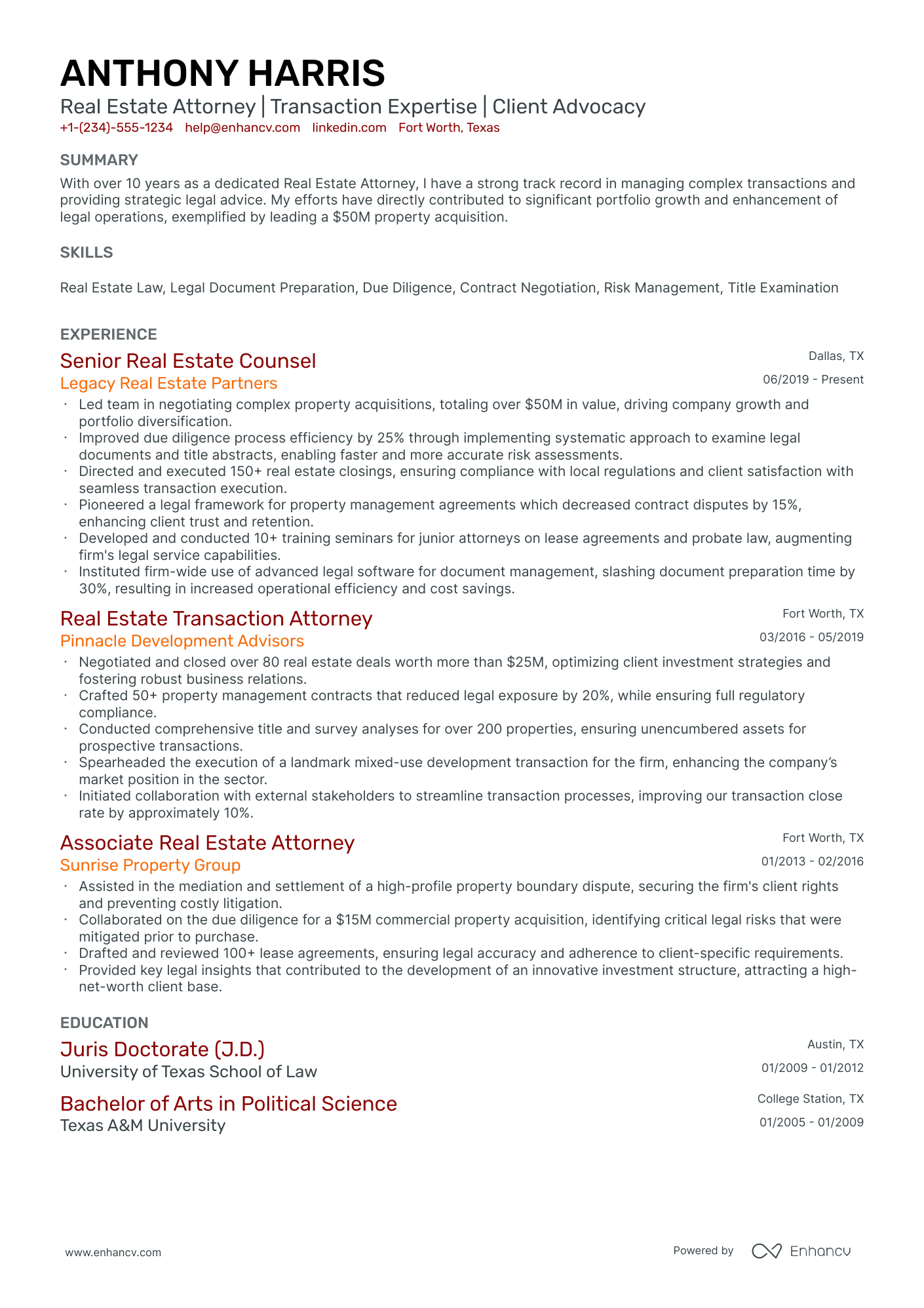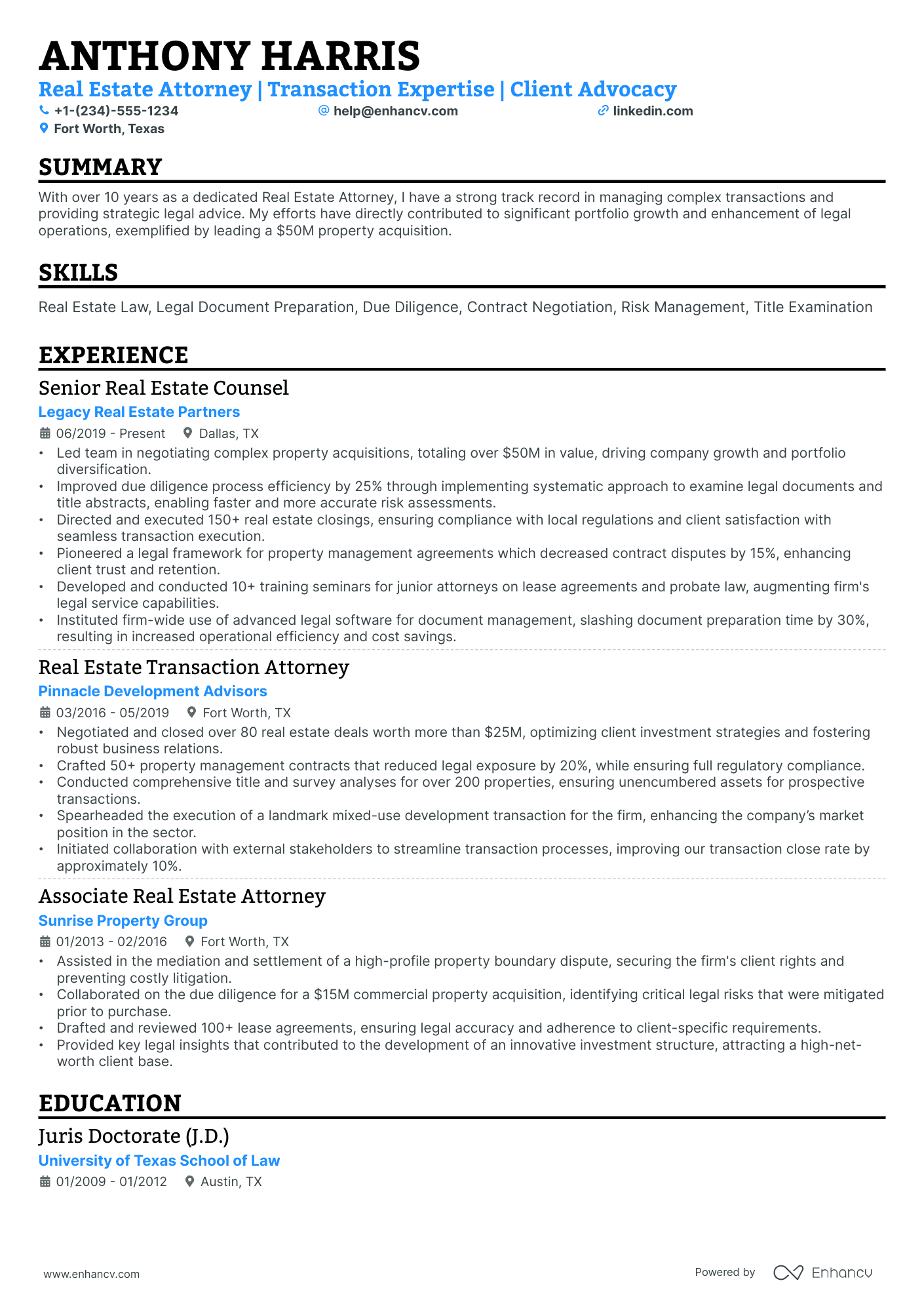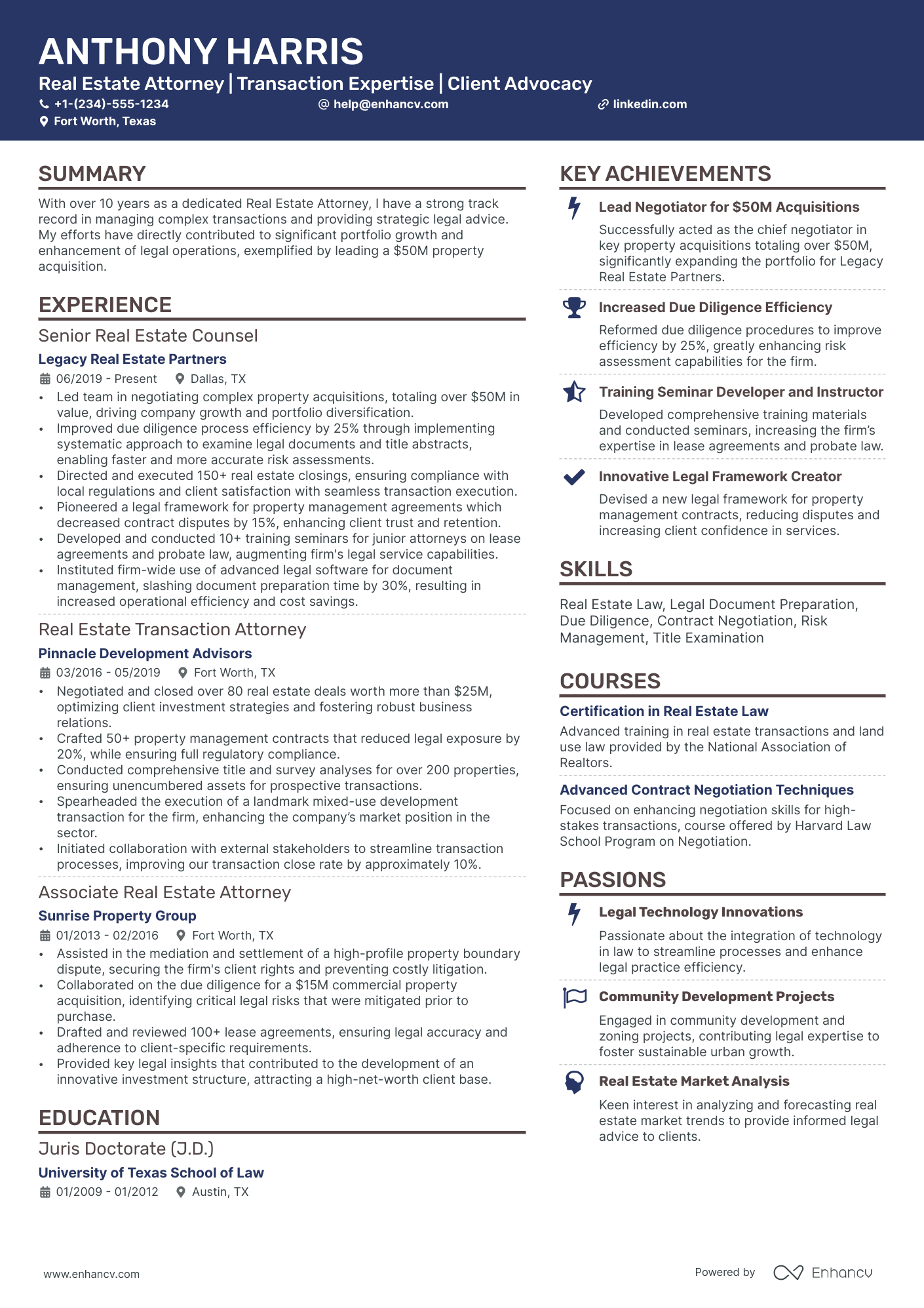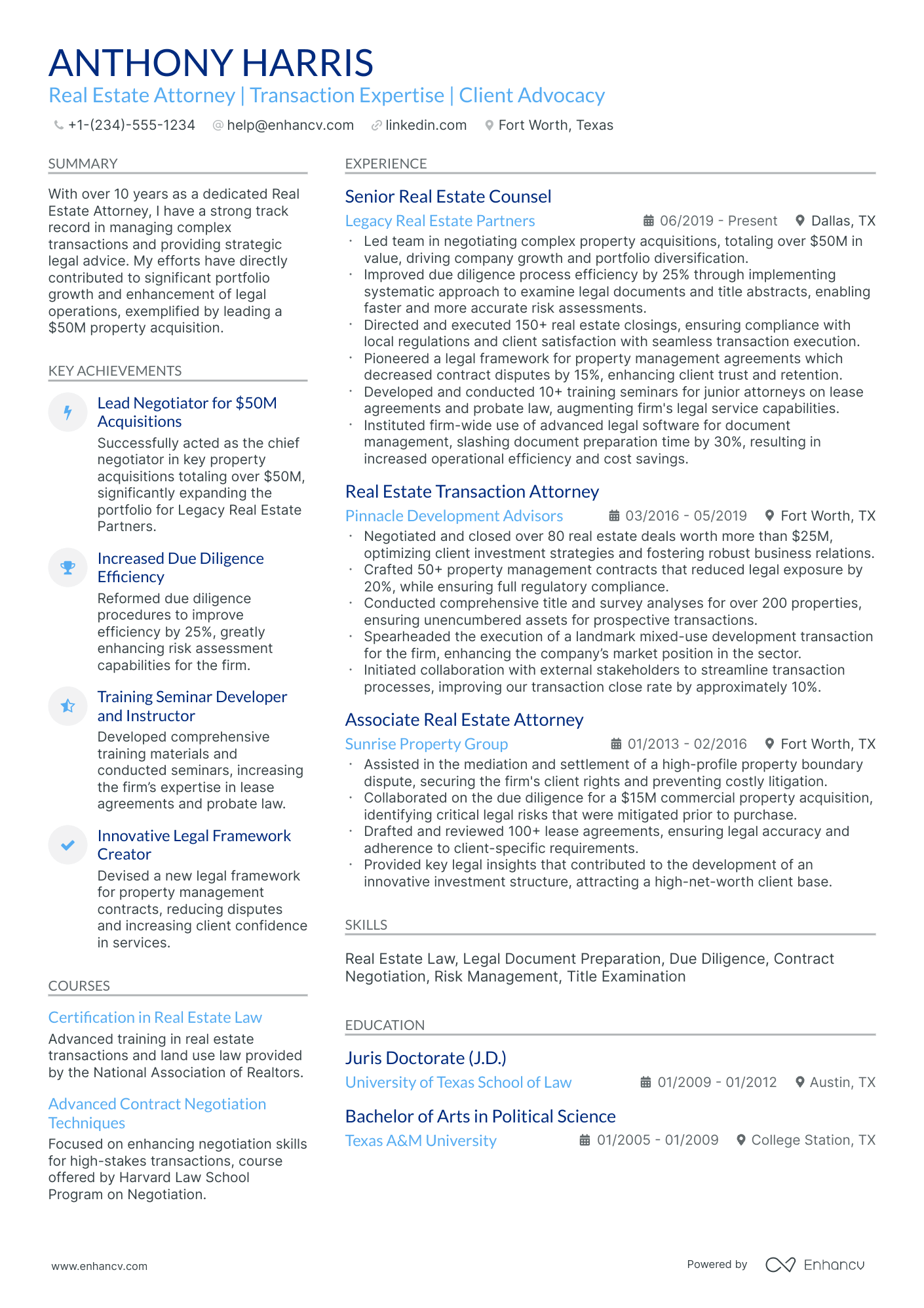As a real estate lawyer, one resume challenge you might face is effectively showcasing your complex transactional experience and legal acumen in a concise manner. Our guide provides tailored strategies to distill your vast expertise into a compelling narrative, ensuring your resume captures the attention of prestigious firms.
- The most straightforward and effective resume format, ensuring your real estate lawyer resume stands out among numerous candidate profiles;
- The significance of the top one-third of your resume, including the header, summary or objective, and skills section, and its impact on recruiters;
- Frameworks and structures used by real real estate lawyer professionals, offering insights on how to enhance your resume with industry-specific expertise;
- A variety of real estate lawyer resume sections that bolster your profile, showcasing your comprehensive capabilities and distinctiveness.
Gaining insights from the best has never been easier. Explore more real estate lawyer resume examples below:
The importance of format and layout in your real estate lawyer resume
Consider you're an HR professional at company X, evaluating two real estate lawyer candidate resumes. John Smith presents a simple, traditional, and easy-to-read resume. Edward Price, however, uses a non-conventional, often illegible format. Whose resume would you spend more time on to understand their experience? This scenario underscores the importance of your real estate lawyer resume’s design. It should be simply formatted and clearly communicate why you are the ideal candidate for the role.Achieve this balance by:
- Listing your experience, beginning with the most recent and relevant, in reverse chronological order;
- Ensuring your header contains essential information, such as contact details, a headline, and a portfolio link. Include a professional photo in the real estate lawyer resume header if you have one;
- Including only the most important and relevant resume sections to showcase your expertise and stand out from other candidates;
- Editing your real estate lawyer resume to be no longer than two pages if you have extensive relevant experience. Use your limited resume space judiciously.
Also, remember that your real estate lawyer resume might initially be scanned by an Applicant Tracker System (ATS).
When it comes to ATS:
- Opt for simple and legible fonts like Raleway, Rubik, Lato, etc., making your experience easy for the ATS to scan;
- Use serif and sans-serif fonts, both of which are ATS-friendly;
- Avoid overused options like Arial and Times New Roman, which, while suitable, may lack personality.
Contrary to a common myth, our recent study shows that the ATS can effectively process both one-column and two-column resumes. Learn more about this in the ATS myths guide.
Finally, when submitting your real estate lawyer resume, always export it as a PDF to ensure all information remains intact, making the document easier to print, read, and scan.
Upload & Check Your Resume
Drop your resume here or choose a file. PDF & DOCX only. Max 2MB file size.
PRO TIP
If you're in the process of obtaining your certificate or degree, list the expected date you're supposed to graduate or be certified.
The key to your real estate lawyer job-winning resume - present your expertise with these sections:
- A header to make your resume more scannable
- Snapshot of who you are as a professional with your resume soft skills, achievements, and summary or objective
- Job advert keywords in the skills section of your resume
- Resume experience quantifying your past job successes with metrics
- A relevant education, certification, and technical sills section to provide background to your technological/software capabilities
What recruiters want to see on your resume:
- Experience in handling real estate transactions, including acquisitions, leases, and sales.
- Knowledge of real estate law, zoning laws, property management, and land use regulations.
- Expertise in conducting title searches, title reviews, and resolving title issues.
- Strong negotiation skills for drafting and reviewing real estate contracts and agreements.
- Successful track record of litigation experience in real estate disputes and foreclosures.
Experts' advice on writing your real estate lawyer resume experience
While the excitement and motivation for writing your real estate lawyer resume was present in the first hour (or so), you now find yourself staring at the blank page.
The resume experience section is the one that allows you to make a memorable impression by matching job requirement with your past jobs and accomplishments.
To help you write this resume section, here are four mistakes you need to avoid:
- Listing every job you have had so far, including the irrelevant ones. Before that, consider each of your past roles based on relevancy to the role. It may be the case that the job you had 15 years ago may have taught you invaluable skills that are appropriate for the role;
- Including irrelevant work experience items. Those are past jobs that aren't linked with the role you're applying for (or so they seem). Consider how your past jobs will serve your professional presentation: will they be filling in a gap in your work history, or just taking up space?
- Focusing on responsibilities instead of accomplishments. Your real estate lawyer resume shouldn't just be telling recruiters what you did in the past - as it's most often the case that candidates have had similar responsibilities. But, rather, the experience section should showcase the success you've attained in each past role, thanks to your unique skill set;
- Consider listing just your professional experience. Any role you've had in the past - e.g. volunteering, internships, etc. - can make it into your real estate lawyer resume experience section. Make sure to include it alongside numbers and results.
Two more things you need to remember about your resume experience section.
The first are keywords. Or those specific job requirements that are crucial for the role . Ensure you've integrated them across your experience section to get sorted closer to the ideal candidate profile by the Applicant Tracker System (ATS).
The second are action verbs. Each of your experience bullets should start with a strong action verb, followed by your specific skill and your on the job achievements. Follow this formula to hint to recruiters what your unique value as a professional is.
Still with us? In the next section, we will show you how industry-leading professionals have avoided the four most common mistakes, while integrating keywords and action verbs in their experience section.
- Advised on and structured complex real estate transactions for a portfolio of properties valued over $50 million, boosting client investment returns by 20%.
- Conducted thorough due diligence for over 30 commercial real estate acquisitions, identifying critical risk factors that saved clients an estimated $10 million in potential losses.
- Led the negotiation and drafting of over 100 commercial lease agreements, ensuring favorable terms for landlord clients and reducing vacancy rates to below 5%.
- Managed legal aspects of residential development projects, including zoning approvals and compliance, facilitating the successful construction of 500+ housing units.
- Implemented legal frameworks for real estate investment trusts (REITs), which attracted $200 million in new capital from institutional and individual investors.
- Expertly handled litigation cases related to real estate disputes, achieving a 90% success rate in case resolutions favorable to our clients.
- Provided expert legal counsel on property tax law for commercial clients, reducing property tax liabilities by 30% through successful appeals.
- Facilitated cross-border real estate deals, optimizing tax structures for international clients and resulting in 15% cost savings on transaction taxes.
- Spearheaded the development of compliance programs for real estate firms, enhancing their operational adherence to regulatory requirements and minimizing legal exposures.
- Directed strategic planning for real estate portfolios using advanced legal analytics, maximizing asset utilization and increasing client net operating income by 25%.
- Developed innovative legal tech solutions to streamline property acquisitions, reducing time on transaction closings by 40% and increasing firm efficiency.
- Negotiated complex land use agreements with government entities on behalf of developers, leading to the launch of three major mixed-use projects within urban renewal areas.
- Oversaw a team of attorneys in estate planning for high net-worth individuals, facilitating the transfer of $200M in real estate assets with optimized tax implications.
- Coordinated with financial institutions to structure real estate financing for developments, resulting in over $500 million in funded projects.
- Orchestrated the legal framework for a groundbreaking urban revitalization plan, integrating sustainable practices and creating 2,000+ jobs in the local economy.
- Navigated through complex regulatory environments to secure entitlements for large-scale real estate projects, reducing approval times by 50% compared to industry standards.
- Championed the rights of property owners in eminent domain cases, securing over $30 million in fair compensation well above initial government offers.
- Devised innovative legal structures for joint ventures in property developments, enhancing project viability and attracting $100 million in equity investments.
- Authored amicus briefs impacting national real estate regulations, shaping policy discourse and leading to more equitable housing laws.
- Conceived a novel real estate distribution algorithm that optimized portfolio diversity for a major property management firm, increasing returns by 18% annually.
- Adjudicated on landmark cases involving commercial property rights, establishing legal precedents that have decreased litigation risk for property developers nationwide.
- Pioneered a compliance program for real estate crowdfunding, enabling safer investment opportunities in compliance with SEC regulations and generating $50 million in crowdfunded capital.
- Orchestrated the legal processes for urban infrastructure projects, ensuring on-time completion and adherence to public-private partnership agreements.
- Collaborated with environmental agencies to integrate eco-friendly practices into property development, facilitating the successful certification of 25 projects under LEED.
The following content includes information from "O*NET OnLine" by the U.S. Department of Labor, Employment and Training Administration (USDOL/ETA). Used under the CC BY 4.0 license. The data represents the top responsibilities present on the task lists for real estate lawyer professionals.
Top Responsibilities for Real Estate Lawyer:
- Interpret laws, rulings and regulations for individuals and businesses.
- Analyze the probable outcomes of cases, using knowledge of legal precedents.
- Gather evidence to formulate defense or to initiate legal actions by such means as interviewing clients and witnesses to ascertain the facts of a case.
- Represent clients in court or before government agencies.
- Evaluate findings and develop strategies and arguments in preparation for presentation of cases.
- Advise clients concerning business transactions, claim liability, advisability of prosecuting or defending lawsuits, or legal rights and obligations.
- Examine legal data to determine advisability of defending or prosecuting lawsuit.
- Prepare, draft, and review legal documents, such as wills, deeds, patent applications, mortgages, leases, and contracts.
- Study Constitution, statutes, decisions, regulations, and ordinances of quasi-judicial bodies to determine ramifications for cases.
- Negotiate settlements of civil disputes.
Quantifying impact on your resume
- Indicate the number of real estate transactions you have successfully closed to demonstrate your experience and efficiency.
- Specify the dollar value of the properties you have dealt with to show your competency in handling high-stake negotiations.
- List the percentage of cases won or successfully settled to highlight your effectiveness in legal disputes.
- Detail how much you decreased legal risk for clients in numeric terms to showcase your ability to protect client assets.
- Mention any increase in the client base or retention rates you contributed to, as it shows your value in business development efforts.
- Include the number of pro bono hours provided to present a commitment to community service and ethical practice.
- Provide figures on how you improved process efficiency, such as reducing time spent on due diligence, to emphasize your organizational skills.
- Quantify any cost savings achieved for clients through effective negotiation or innovative legal strategy to illustrate financial acumen.
Action verbs for your real estate lawyer resume
How to shift the focus from your real estate lawyer resume experience section to your professional profile
If you're at the start of your career journey or transitioning industries, you might be concerned about the lack of professional experience while crafting your real estate lawyer resume.
How can you effectively present your real estate lawyer resume experience section under these circumstances?
Rather than a traditional, extensive experience section, demonstrate your expertise through:
- Emphasizing your education. Your academic background might impress recruiters, especially if it includes recent, industry-relevant knowledge;
- Creating a compelling objective statement. The first few sentences of your resume should map out your motivations and career aspirations, offering insight into your goals;
- Highlighting your transferable skills. For example, if you've honed communication skills through volunteering, illustrate on your real estate lawyer resume how these can benefit a potential employer;
- Detailing your technical background in certifications and skills sections. As a recent graduate, your technological foundations might be particularly attractive to employers looking to develop these skills further.
It's important to remember that employers sometimes prefer candidates with less experience but who are a better cultural fit for their organization.
Recommended reads:
PRO TIP
Highlight any significant extracurricular activities that demonstrate valuable skills or leadership.
The right balance between hard skills and soft skills for your real estate lawyer resume
Wondering what the perfect real estate lawyer resume looks like? The candidate's profile meets job requirements by balancing both hard skills and soft skills across their resume.
- Hard skills are all the technologies you're apt at using . Prove you have the right technical background by listing key industry hardware/software in your real estate lawyer resume skills section and noteworthy certifications.
- Soft skills are both your personal, mindset, communication, analytical, and problem-solving talents . Use your real estate lawyer resume achievements section to show how you've used a particular soft skill to reach a tangible outcome.
When writing about your unique skill set, always make sure to refer back to the job advert to see what are the key requirements. This ensures you've tailored your resume so that it matches closer to what the ideal candidate profile is.
Top skills for your real estate lawyer resume:
Contract Drafting
Property Law Knowledge
Real Estate Transaction Management
Title and Survey Analysis
Zoning and Land Use Regulations
Negotiation Software
Document Management Systems
Legal Research Tools
Case Management Software
E-discovery Tools
Communication
Analytical Thinking
Attention to Detail
Problem Solving
Negotiation
Time Management
Interpersonal Skills
Client Management
Adaptability
Critical Thinking
Next, you will find information on the top technologies for real estate lawyer professonals from "O*NET OnLine" by the U.S. Department of Labor, Employment and Training Administration (USDOL/ETA). Used under the CC BY 4.0 license.
Top technologies for Real Estate Lawyer’s resume:
- LexisNexis CaseMap
- Microsoft Access
- IDEA TrialPro
- Microsoft PowerPoint
- Adobe Acrobat
- Microsoft Office SharePoint Server MOSS
PRO TIP
If you happen to have plenty of certificates, select the ones that are most applicable and sought-after across the industry. Organize them by relevance to the role you're applying for.
The real estate lawyer resume sections you may underestimate: certifications and education
Your education and certifications provide insight into both your technical capabilities and personal attributes, such as perseverance. When crafting your real estate lawyer resume, consider how you present these elements:
- For your higher education degrees, prioritize listing those most relevant to the job or indicative of your academic dedication;
- Include applicable coursework as a stand-in for relevant experience or if it might impress recruiters;
- Include incomplete higher education only if it's pertinent to meeting job requirements;
- If your degree is from a renowned university, mention how often you made the Dean's list to underline academic excellence.
Regarding certifications, it's not necessary to list all of them. Instead, match up to three of your most recent or significant certificates with the technical skills required in the job description.
Below, we've selected some of the top industry certifications that could be vital additions to your real estate lawyer resume.
The top 5 certifications for your real estate lawyer resume:
- Real Estate Law Specialist Certification (RELS) - ABA-accredited state bar associations
- Certified Commercial Investment Member (CCIM) - CCIM Institute
- Real Property Certification (RPC) - American Board of Certification
- LEED Accredited Professional (LEED AP) - U.S. Green Building Council
- National Association of Realtors' Green Designation (NAR's Green) - National Association of Realtors
The content below includes information from "O*NET OnLine" by the U.S. Department of Labor, Employment and Training Administration (USDOL/ETA). Used under the CC BY 4.0 license. The data represents the top associations for real estate lawyer professionals.
Top US associations for a Real Estate Lawyer professional
- American Association for Justice
- American Bar Association
- American Health Lawyers Association
- DRI
- Federal Bar Association
PRO TIP
If you happen to have some basic certificates, don't invest too much of your real estate lawyer resume real estate in them. Instead, list them within the skills section or as part of your relevant experience. This way you'd ensure you meet all job requirements while dedicating your certificates to only the most in-demand certification across the industry.
Recommended reads:
Real estate lawyer resume summary or objective? The best choice is based on your experience
If you're wondering about the relevancy of the resume summary or the resume objective to your real estate lawyer application - here's the truth.
The summary and objective provide recruiters with your expertise and accomplishments at a glance, within an up-to-five-sentence structure.
The difference is that the:
- Resume objective is also more focused on emphasizing your career goals. The objective is the perfect fit for (potentially more junior) candidates who'd like to balance their relevant experience with their career goals.
- Resume summary can provide you with space to also detail the unique value of what it's like to work with you. Real estate lawyer candidates who have many noteworthy accomplishments start from the get-go with their summary.
Ensure that either type of resume introduction presents your real estate lawyer expertise in the best light and aligns it with the job advert.
The more details you can provide with numbers, the more compelling your resume summary or objective will be.
Real-world real estate lawyer candidates follow these frameworks in writing their resume summaries and objectives.
The end results are usually as such:
Resume summaries for a real estate lawyer job
- Seasoned real estate attorney with over 15 years of experience specializing in commercial property transactions, lease negotiations, and litigation. Proven ability to manage complex cases, says mastered title insurance, and land use law, resulting in a significant win in a multi-million-dollar eminent domain case. Eager to provide top-tier legal services in a challenging and dynamic environment.
- Accomplished litigator with a decade's experience in corporate law, transitioning into real estate law. Known for outstanding negotiation skills, a precise understanding of corporate structures, and success in high-stake merger cases. Recently completed comprehensive real estate law certification and ready to apply a keen legal acumen to a new chapter in a real estate-focused practice.
- Financial analyst with a robust 8-year track record in the commercial banking sector, pivoting to real estate law. Extensive expertise in investment strategies, risk assessment, and regulatory compliance, recently supplemented by a law degree with an emphasis on property law. Committed to leveraging financial insight and newly-acquired legal knowledge to excel in real estate legal consultations.
- Diligent real estate attorney with 12 years of experience in residential and commercial property deals, land use zoning, and environmental regulations. Succeeded in reducing legal risks for clients through proactive due diligence and strategic advice, including a landmark case that set precedent in local zoning laws. Keen on crafting innovative solutions for complex legal property challenges.
- Recent law school graduate with internship experience in contract law and a demonstrated passion for real estate development. Bringing a fresh perspective, an eagerness to learn, and robust research skills. Objective: to kick-start a career by providing energetic support contributing to high-profile property transactions and diverse real estate legal services.
- Enthusiastic new entrant to the legal field, holding a J.D. with a concentration in real estate law. Brings to the table an in-depth academic understanding of property rights, financing, and commercial transactions, along with a 6-month clerkship in a real estate legal firm. Objective: to build a career in real estate law through dedication, a positive attitude, and a commitment to client success.
Average salary info by state in the US for Real Estate Lawyer professionals
Local salary info for Real Estate Lawyer.” Source: My Next Move, National Center for O*NET Development. Accessed 10/15/2024
| State | Average Salary (in USD) |
|---|---|
| US National Average | $145,760 |
| California (CA) | $185,050 |
| Texas (TX) | $145,000 |
| Florida (FL) | $121,500 |
| New York (NY) | $179,650 |
| Pennsylvania (PA) | $130,270 |
| Illinois (IL) | $161,880 |
| Ohio (OH) | $117,500 |
| Georgia (GA) | $131,090 |
| North Carolina (NC) | $133,130 |
| Michigan (MI) | $121,760 |
Four more sections for your real estate lawyer resume
Your real estate lawyer resume can be supplemented with other sections to highlight both your personality and efforts in the industry. Use the ones you deem most relevant to your experience (and the role):
- Awards - to celebrate your success;
- Interests - to detail what you're passionate about outside of work (e.g. music, literature, etc.);
- Publications - to show your footprint in the wider community;
- Projects - to pinpoint noteworthy achievements, potentially even outside of work.
Key takeaways
- Invest in a concise real estate lawyer professional presentation with key resume sections (e.g. header, experience, summary) and a simple layout;
- Ensure that the details you decide to include in your resume are always relevant to the job, as you have limited space;
- Back up your achievements with the hard and soft skills they've helped you build;
- Your experience could help you either pinpoint your professional growth or focus on your niche expertise in the industry;
- Curate the most sought-after certifications across the industry for credibility and to prove your involvement in the field.
